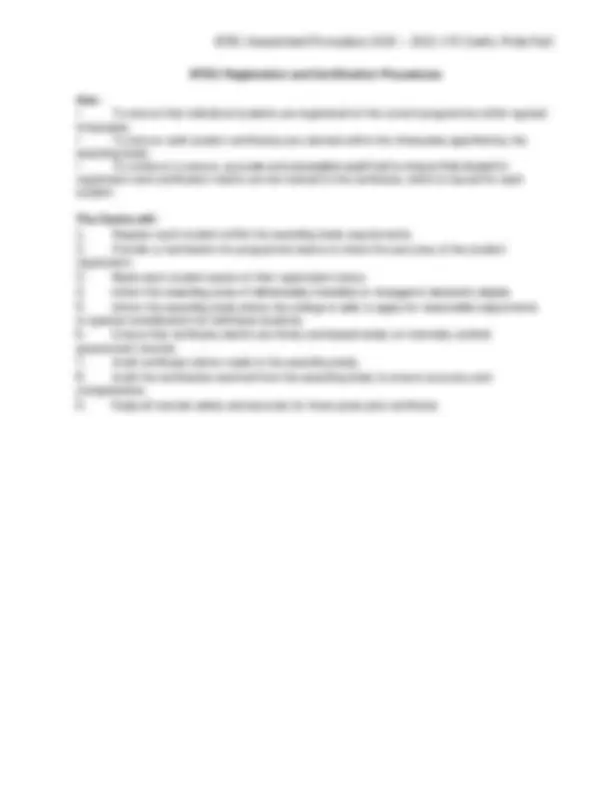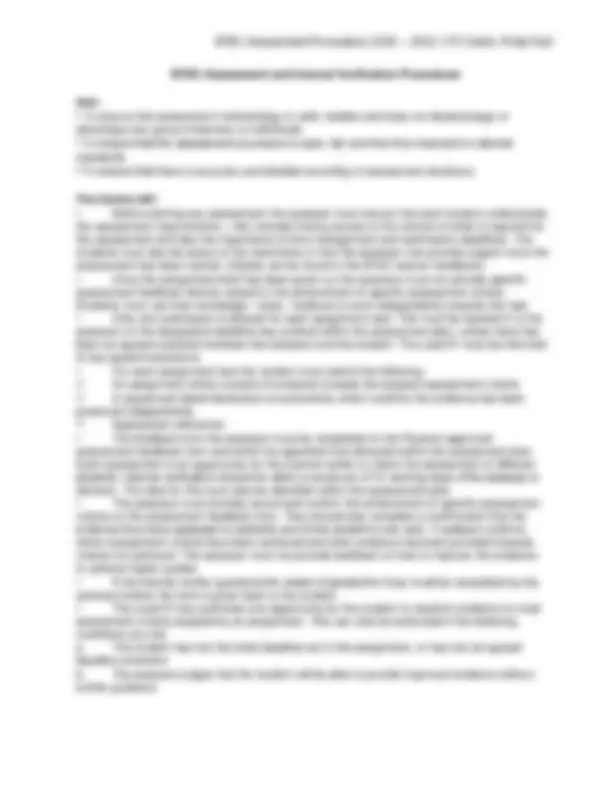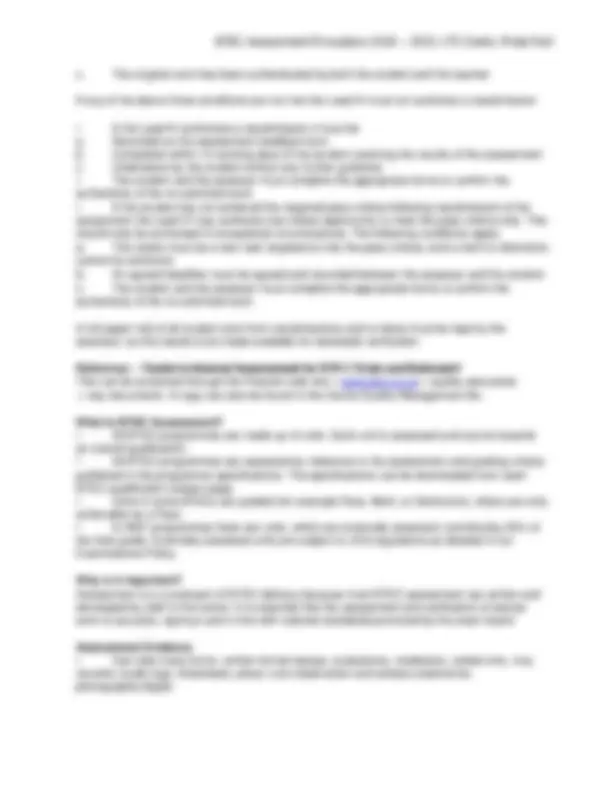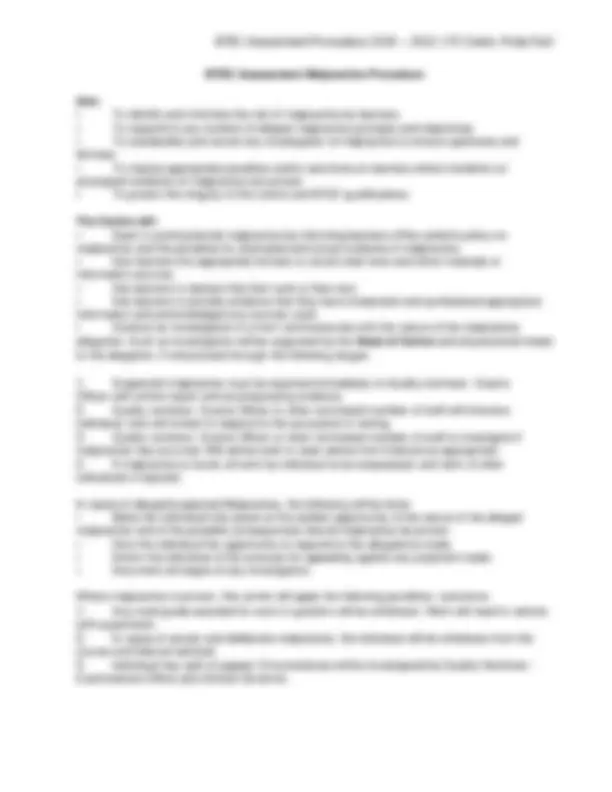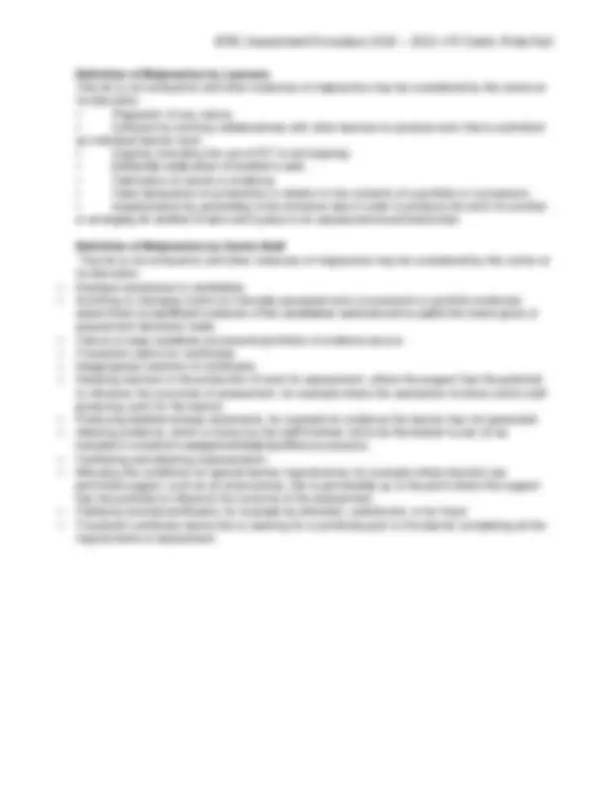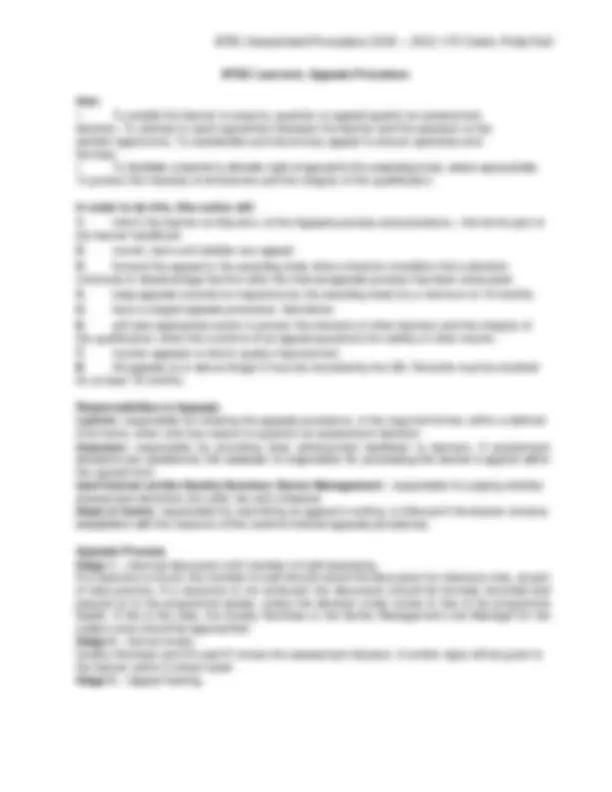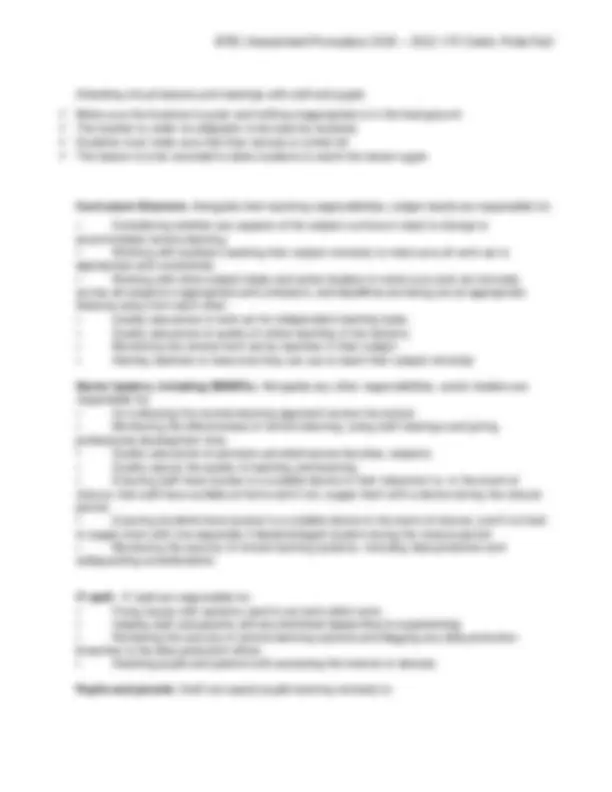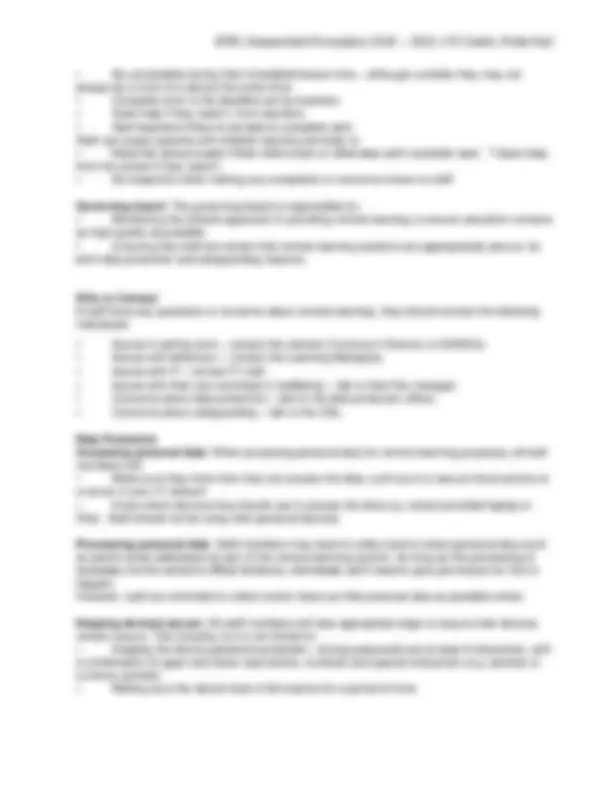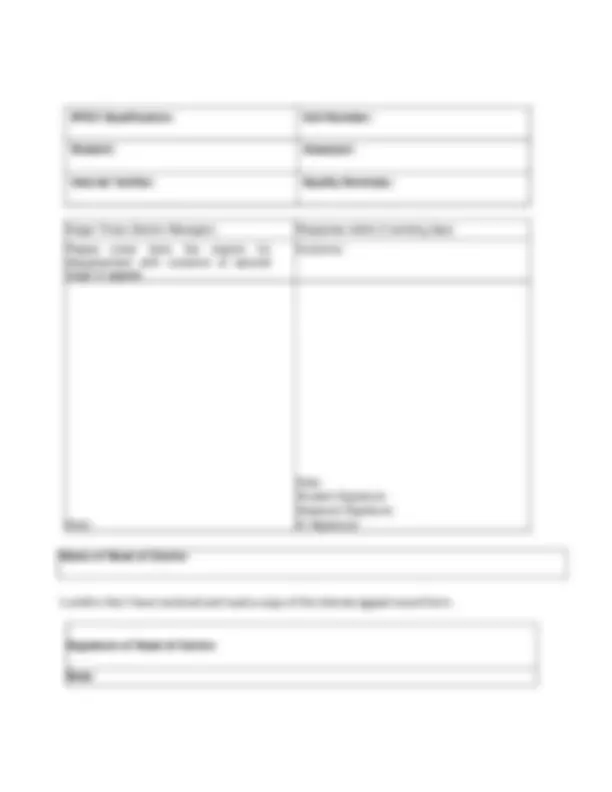Download BTEC Assessment at UTC Derby: Policies, Procedures, & Prevention and more Exercises Quality Management in PDF only on Docsity!
BTEC Assessment Procedures
Status: Statutory
Staff responsible: Principal
Reviewed by: Quality Nominee
Review date : September 2020
Next review date: September 2021
BTEC Assessment Procedures Rationale The purpose of this document is to ensure that all BTEC programmes are appropriately implemented and meet the guidelines set by the examination board and JCQ assessment policies. This document is to be used in conjunction with the UTC’s examinations and assessment policy and a range of guidance available on the Edexcel website. Aims: This document contains several separate procedures, which collectively aim to ensure that the UTC has in place administrative systems, policies and procedures to ensure that there is effective management of the delivery and assessment of qualifications, ensuring that:
- qualification approvals are accurate and timely and reflective of a centre delivery
- the centre continues to meet all Qualification Approval criteria for each qualification
- adequate records are maintained to meet Pearson requirements and made available to Pearson representatives, as required. This document includes the following: BTEC Registration and Certification Procedures BTEC Assessment and Internal Verification Procedures BTEC Assessment Malpractice Procedure BTEC Learners Appeals Procedure BTEC Blended Learning Procedure
BTEC Assessment and Internal Verification Procedures Aim:
- To ensure that assessment methodology is valid, reliable and does not disadvantage or advantage any group of learners or individuals.
- To ensure that the assessment procedure is open, fair and free from bias and to national standards.
- To ensure that there is accurate and detailed recording of assessment decisions. The Centre will:
- Before starting any assessment the assessor must ensure that each student understands the assessment requirements – this includes having access to the content of what is required for the assessment and also the importance of time management and submission deadlines. The students must also be aware of the restrictions in how the assessor can provide support once the assessment has been started. (Details can be found in the BTEC learner handbook).
- Once the assignment brief has been given out the assessor must not provide specific assessment feedback directly related to the achievement of specific assessment criteria. Students must use their knowledge / notes / textbook to work independently towards the task
- Only one submission is allowed for each assignment task. This must be handed in to the assessor on the designated deadline day outlined within the assessment plan, unless there has been an agreed extension between the assessor and the student. The Lead IV must be informed of any agreed extensions.
- For each assignment task the student must submit the following:
✓ An assignment which consists of evidence towards the targeted assessment criteria
✓ A signed and dated declaration of authenticity which confirms the evidence has been
produced independently
✓ Appropriate references
- The feedback from the assessor must be completed on the Pearson approved assessment feedback form and within the specified time allocated within the assessment plan. Each assessment is an opportunity for the internal verifier to check the assessment of different students. Internal verification should be within a maximum of 10 working days of the assessor’s decision. The date for this must also be identified within the assessment plan
- The assessor must formally record and confirm the achievement of specific assessment criteria on the assessment feedback form. They should also complete a confirmation that the evidence they have assessed is authentic and is the student’s own work. Feedback confirms which assessment criteria have been achieved and what evidence has been provided towards criteria not achieved. The assessor must not provide feedback on how to improve the evidence to achieve higher grades.
- If the internal verifier questions the award of grades the ‘loop’ must be completed by the assessor before the work is given back to the student.
- The Lead IV may authorise one opportunity for the student to resubmit evidence to meet assessment criteria targeted by an assignment. This can only be authorised if the following conditions are met a. The student has met the initial deadline set in the assignment, or has met an agreed deadline extension b. The assessor judges that the student will be able to provide improved evidence without further guidance
c. The original work has been authenticated by both the student and the teacher If any of the above three conditions are not met the Lead IV must not authorise a resubmission
- If the Lead IV authorises a resubmission it must be a. Recorded on the assessment feedback form b. Completed within 15 working days of the student receiving the results of the assessment c. Undertaken by the student without any further guidance
- The student and the assessor must complete the appropriate forms to confirm the authenticity of the re submitted work
- If the student has not achieved the targeted pass criteria following resubmission of the assignment the Lead IV may authorise one retake opportunity to meet the pass criteria only. This should only be authorised in exceptional circumstances. The following conditions apply:
a. The retake must be a new task targeted at only the pass criteria, and a merit or distinction
cannot be achieved.
b. An agreed deadline must be agreed and recorded between the assessor and the student
c. The student and the assessor must complete the appropriate forms to confirm the
authenticity of the re submitted work A full paper trail of all student work from resubmissions and re takes must be kept by the assessor, as this needs to be made available for standards verification Reference – ‘Guide to Internal Assessment for BTEC Firsts and Nationals’ This can be accessed through the Pearson web site > www.btec.co.uk > quality assurance .> key documents. A copy can also be found in the Centre Quality Management file. What is BTEC Assessment?
- All BTEC programmes are made up of units. Each unit is assessed and counts towards an overall qualification.
- All BTEC programmes are assessed by reference to the assessment and grading criteria published in the programme specifications. The specifications can be downloaded from each BTEC qualification subject page.
- Units in some BTECs are graded (for example Pass, Merit, or Distinction); others are only achievable as a Pass.
- In NQF programmes there are units, which are externally assessed, contributing 25% of the final grade. Externally assessed units are subject to JCQ regulations as detailed in our Examinations Policy. Why is it important? Assessment is a crucial part of BTEC delivery because most BTEC assessment are written and developed by staff in the centre. It is essential that the assessment and verification of learner work is accurate, rigorous and in line with national standards promoted by the exam board Assessment Evidence
- Can take many forms: written-formal essays, evaluations, notebooks; verbal-crits, viva; records; studio logs; timesheets; plans; tutor observation and witness statements; photographic/digital.
internally verified will be determined by the Lead IV – it should be made up wherever possible of a piece of work at all three levels of achievement (P, M & D) and one more of the most common grade. It is recommended that this number is increased for either new assessors to BTEC (> to 50% for first assessed piece of work) or for programmes with large cohorts of students (>20) Why is it important? Assessment is a crucial part of BTEC delivery because most BTEC assessment are written and developed by staff in the centre. It is essential that the assessment and verification of learner work is accurate, rigorous and in line with national standards promoted by the exam board Assessment decisions of internally assessed units are totally in the hands of centre staff. Internal Verification checks that the standards set by the awarding body are being maintained. Further guidance can be found in the Centre Guide to Managing Quality on the Key Documents page of the BTEC website: www.edexcel.com/quals/BTEC/quality/Pages/documents.aspx New Staff Any new member of staff will need an induction programme to make sure they fully understand all the BTEC requirements of their role they must also review the relevant UTC policies. This will normally be a Faculty responsibility but extra support will be offered by the Quality Nominee if necessary. Full details are also provided in the BTEC staff handbook which is updated annually. Standards Verification When a Principal Subject Area is going through standards verification the following will apply:
- The Quality Nominee will initially take the lead in liaising with Pearson regarding the standards verifier.
- After the initial contact the Quality Nominee or Programme Manager will liaise with the allocated standards verifier regarding the sample requested.
- If there is an unsuccessful outcome from the 1st sample there will be a 2nd sample.
- It is essential at this stage that the Programme Manager consults with the Quality Nominee to ensure that the second sample is checked thoroughly and that the advice and guidance given by the Standards Verifier is applied to this sample.
- If the second sample has an unsuccessful outcome the Regional Quality Manager will set up a remedial action plan.
- Before the agreed sample date the standards verifier will need the following:
- A list of all completed units.
- A list of anticipated learner grades.
- A list of which learner work has been Internally Verified.
- The Standards verifier will then select a sample from the list and for the sample they will require:
- The assignment brief(s) for the whole unit with evidence of internal verification • For each learner sampled, a portfolio of work for the complete unit with, evidence of assessment and internal verification
- For graded qualifications, learner work at all grades.
BTEC Assessment Malpractice Procedure Aim:
- To identify and minimise the risk of malpractice by learners.
- To respond to any incident of alleged malpractice promptly and objectively.
- To standardise and record any investigation of malpractice to ensure openness and fairness.
- To impose appropriate penalties and/or sanctions on learners where incidents (or attempted incidents) of malpractice are proven.
- To protect the integrity of this centre and BTEC qualifications. The Centre will:
- Seek to avoid potential malpractice by informing learners of the centre’s policy on malpractice and the penalties for attempted and actual incidents of malpractice.
- how learners the appropriate formats to record cited texts and other materials or information sources.
- Ask learners to declare that their work is their own.
- Ask learners to provide evidence that they have interpreted and synthesised appropriate information and acknowledged any sources used.
- Conduct an investigation in a form commensurate with the nature of the malpractice allegation. Such an investigation will be supported by the Head of Centre and all personnel linked to the allegation. It will proceed through the following stages:
1. Suspected malpractice must be reported immediately to Quality nominee / Exams
Officer with written report and accompanying evidence.
2. Quality nominee / Exams Officer or other nominated member of staff will interview
individual, who will invited to respond to the accusation in writing.
3. Quality nominee / Exams Officer or other nominated member of staff to investigate if
malpractice has occurred. Will advise and/ or seek advice from Edexcel as appropriate.
4. If malpractice is found, all work by individual to be reassessed, and work of other
individuals if required. In cases of alleged/suspected Malpractice, the following will be done:
- Make the individual fully aware at the earliest opportunity of the nature of the alleged malpractice and of the possible consequences should malpractice be proven.
- Give the individual the opportunity to respond to the allegations made.
- Inform the individual of the avenues for appealing against any judgment made.
- Document all stages of any investigation. Where malpractice is proven, this centre will apply the following penalties / sanctions:
1. Any mark/grade awarded for work in question will be withdrawn. Work will need to redone
with supervision.
2. In cases of severe and deliberate malpractice, the individual will be withdrawn from the
course and Edexcel advised.
3. Individual has right of appeal. Circumstances will be investigated by Quality Nominee /
Examinations Officer plus School Governor.
BTEC Learners- Appeals Procedure Aim:
- To enable the learner to enquire, question or appeal against an assessment decision. To attempt to reach agreement between the learner and the assessor at the earliest opportunity. To standardise and record any appeal to ensure openness and fairness.
- To facilitate a learner’s ultimate right of appeal to the awarding body, where appropriate. To protect the interests of all learners and the integrity of the qualification. In order to do this, this centre will:
1. inform the learner at induction, of the Appeals process and procedure – this forms part of
the learner handbook.
2. record, track and validate any appeal.
3. forward the appeal to the awarding body when a learner considers that a decision
continues to disadvantage her/him after the internal appeals process has been exhausted.
4. keep appeals records for inspection by the awarding body for a minimum of 18 months.
5. have a staged appeals procedure. See below.
6. will take appropriate action to protect the interests of other learners and the integrity of
the qualification, when the outcome of an appeal questions the validity of other results.
7. monitor appeals to inform quality improvement.
8. All appeals at or above Stage 2 must be recorded by the QN. Records must be retained
for at least 18 months. Responsibilities in Appeals Learner: responsible for initiating the appeals procedure, in the required format, within a defined time frame, when s/he has reason to question an assessment decision. Assessor: responsible for providing clear achievement feedback to learners. If assessment decisions are questioned, the assessor is responsible for processing the learner’s appeal within the agreed time. lead internal verifier/Quality Nominee /Senior Management: responsible for judging whether assessment decisions are valid, fair and unbiased. Head of Centre : responsible for submitting an appeal in writing, to Edexcel if the learner remains dissatisfied with the outcome of the centre’s internal appeals procedures. Appeals Process Stage 1 – informal discussion with member of staff assessing. If a resolution is found, the member of staff should record the discussion for reference only, as part of best practice. If a resolution is not achieved, the discussion should be formally recorded and passed on to the programme leader, unless the decision under review is that of the programme leader. If this is the case, the Quality Nominee or the Senior Management Line Manager for the subject area should be approached. Stage 2 – formal review. Quality Nominee and IV/Lead IV review the assessment decision. A written reply will be given to the learner within 2 school week Stage 3 – Appeal hearing.
The learner must apply to the Head of Centre in writing within 4 school weeks of the initiation of the stage 2 formal review. An appeal panel, appointed by the Head of Centre, will meet and review the evidence. A formal response will be given to the learner. Stage 4 – External appeal: The grounds for appeal and any supporting documentation must be submitted by the centre to Edexcel within 14 days of the completion of Stage 4: a fee is levied. Appeals Process Summary
- Students will be informed about the appeals procedure and have access to a copy of the written procedure.
- The Quality Nominee and the Exams Officer will be responsible for the management of internal appeals.
- The Head of the Centre will be provided with any appeals and their outcome.
- Appeals will be considered by at least 2 people (none of whom should have been involved with the assessment decision).
- A clear timescale in terms of the student getting a response to the appeal is laid out on the appeals form.
- Students will be allowed representation by a parent/guardian/friend if requested.
- Written records of all appeals will be kept by the school including the outcome of the appeal and reasons for the outcome.
- A copy of the appeals record will be given to the student.
- Edexcel will be informed by the school if any outcome of an appeal has implications for the conduct of assessments of the issue of results at the school.
- Full details of any appeal must be made available to Edexcel on request.
- Students can only appeal on the following grounds:-
- If they feel the grading criteria is being met.
- If they feel that they have not been supported during the assessment of the unit.
- If the teacher is not willing to accept alternative evidence as meeting the evidence requirement.
Attending virtual lessons and meetings with staff and pupils
✓ Make sure the locations is quiet and nothing inappropriate is in the background.
✓ The teacher is under no obligation to be seen by students.
✓ Students must make sure that their camera is turned off.
✓ The lesson is to be recorded to allow students to watch the lesson again.
Curriculum Directors : Alongside their teaching responsibilities, subject leads are responsible for:
- Considering whether any aspects of the subject curriculum need to change to accommodate remote learning.
- Working with teachers teaching their subject remotely to make sure all work set is appropriate and consistently.
- Working with other subject leads and senior leaders to make sure work set remotely across all subjects is appropriate and consistent, and deadlines are being set an appropriate distance away from each other.
- Quality assurance of work set for independent learning tasks.
- Quality assurance of quality of online teaching in live lessons.
- Monitoring the remote work set by teachers in their subject
- Alerting teachers to resources they can use to teach their subject remotely Senior leaders, including SENDCo: Alongside any other responsibilities, senior leaders are responsible for:
- Co-ordinating the remote learning approach across the school.
- Monitoring the effectiveness of remote learning; using staff meetings and giving professional development time.
- Quality assurance of provision provided across faculties, subjects.
- Quality assure the quality of teaching and learning.
- Ensuring staff have access to a suitable device in their classroom or, in the event of closure, that staff have suitable at home and if not, supply them with a device during the closure period.
- Ensuring students have access to a suitable device in the event of closure, and if not look to supply them with one especially if disadvantaged student during the closure period.
- Monitoring the security of remote learning systems, including data protection and safeguarding considerations. IT staff: IT staff are responsible for:
- Fixing issues with systems used to set and collect work.
- Helping staff and parents with any technical issues they’re experiencing.
- Reviewing the security of remote learning systems and flagging any data protection breaches to the data protection officer.
- Assisting pupils and parents with accessing the internet or devices. Pupils and parents : Staff can expect pupils learning remotely to:
- Be contactable during their timetabled lesson time – although consider they may not always be in front of a device the entire time.
- Complete work to the deadline set by teachers.
- Seek help if they need it, from teachers.
- Alert teachers if they’re not able to complete work. Staff can expect parents with children learning remotely to:
- Make the school aware if their child is sick or otherwise can’t complete work. Seek help from the school if they need it.
- Be respectful when making any complaints or concerns known to staff. Governing board : The governing board is responsible for:
- Monitoring the schools approach to providing remote learning to ensure education remains as high quality as possible.
- Ensuring that staff are certain that remote learning systems are appropriately secure, for both data protection and safeguarding reasons. Who to Contact If staff have any questions or concerns about remote learning, they should contact the following individuals:
- Issues in setting work – contact the relevant Curriculum Director or SENDCo.
- Issues with behaviour – contact the Learning Managers.
- Issues with IT – contact IT staff.
- Issues with their own workload or wellbeing – talk to their line manager.
- Concerns about data protection – talk to the data protection officer.
- Concerns about safeguarding – talk to the DSL. Data Protection Accessing personal data: When accessing personal data for remote learning purposes, all staff members will:
- Make sure they know how they can access the data, such as on a secure cloud service or a server in your IT network
- Know which devices they should use to access the data e.g. school provided laptop or iPad. Staff should not be using their personal devices Processing personal data : Staff members may need to collect and/or share personal data such as parent email addresses as part of the remote learning system. As long as this processing is necessary for the school’s official functions, individuals won’t need to give permission for this to happen. However, staff are reminded to collect and/or share as little personal data as possible online. Keeping devices secure: All staff members will take appropriate steps to ensure their devices remain secure. This includes, but is not limited to:
- Keeping the device password-protected – strong passwords are at least 8 characters, with a combination of upper and lower-case letters, numbers and special characters (e.g. asterisk or currency symbol).
- Making sure the device locks if left inactive for a period of time.
BTEC Qualification: Unit Number: Student: Assessor: Internal Verifier: Quality Nominee: Stage One (Unit Assessor) Response within 5 working days Reason for Appeal (please give full details): Outcome: Date: Date: Assessor Signature: IV Signature: I agree/disagree with the outcome of Stage One of the appeal. Student Signature:
BTEC Qualification: Unit Number: Student: Assessor: Internal Verifier: Quality Nominee: Stage Two (Internal Verifier) Response within 5 working days Please enter here the reason for disagreement with outcome of first stage of appeal: Outcome: Date: Date: Assessor Signature: IV Signature: I agree/disagree with the outcome of Stage Two of the Appeal: Student Signature:

